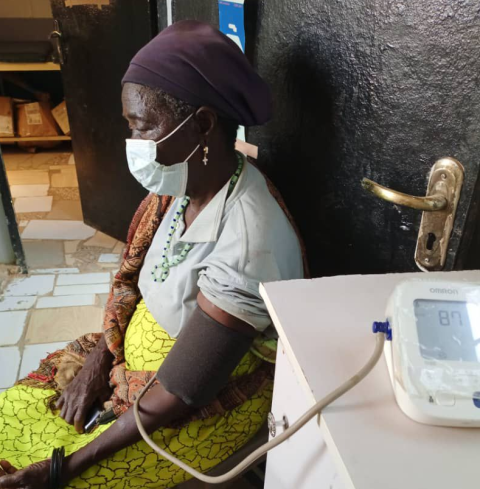
UN International Day of World Elder Abuse June 2024: Spotlight on Older Persons in Emergencies
Neglected displaced elders face homelessness as New Kuchingoro IDP camp in Abuja is threatened with closure.
This year's World Elder Abuse Awareness Day (WEAAD), with the theme "Spotlight on Older Persons in Emergencies," emphasises the urgent need to protect and support older individuals during crises.
Internal displacement in Nigeria
Nigeria currently has the 3rd largest number of internally displaced persons (IDPs) in Africa, with 3.3 million people displaced from their homes and living in their country's borders. In Nigeria, internal displacement is due to overlapping and intersecting problems including protracted violence and climate change. Boko Haram and other non-state armed groups, alongside clashes between herders and farmers, have pushed Nigerians out of their homes, especially from parts of North-East Nigeria and the country’s Middle Belt, but increasingly also from North-West Nigeria.
Harsh living conditions for elders in New Kuchingoro Camp
Daily life for the elders in New Kuchingoro IDP camp is inhumane. The camp is a makeshift small township with no running water, lack of basic amenities and no government support. The elders are hungry, destitute and affected by numerous diseases like tuberculosis, and malaria alongside age-related health problems including hypertension, arthritis, eye problems, especially cataracts and diabetes. They have been forced to fend for themselves as many do not have family or caregivers with them.
Elders' journey to displacement
In New Kuchinguro IDP camp most of the displaced elders are from Gwoza LGA (Local Government Authority), Borno State attacked by Boko Haram 10 years ago. One 58-year-old elder described his journey:
‘I followed the mountain to Cameroon then I went to Yola Adamawa state, I spent one week there then I came to Nasarawa State. I spent three years in Nasarawa State from there to this IDP camp Kuchingoro here in Abuja’
The impact of displacement on Elders’ social roles and access to support
Globally many older people feel excluded, however, displaced elders are disproportionately affected. In new Kuchingoro the elders feel like they have lost their roles in the community, family support and any access to support including healthcare, safety and security or sustainable livelihood programs.
‘We feel helpless, frail and alone, there are language barriers and only a few places where we feel safe.’
‘Our general health and mental health are suffering, we feel powerless, depressed and want to return home, but it is not safe.’
Impact of Exclusion on Elders
Exclusion of older adults has been linked with a negative impact on dignity, perceived self-worth, and respect (Serrat, Scharf, & Villar, 2022), depression, powerlessness, and dissatisfaction with life (Ekoh et al., 2022b), a decrease in quality of life, and increased mortality (Atumah & Ekele, 2019).
Efforts of PADEAP Nigeria and ILERA Community Health Initiative
The Nigerian government has failed to address the needs of the displaced elders living in formal and informal IDP camps all over the country.
PADEAP Nigeria (Pan-African Development, Education and Advocacy Programme) and ILERA Community Health Initiative (ILERA) have been working with the displaced elders in New Kuchingoro IDP camp in Abuja for 5 years. The elders are Glavda speakers, Glavda is one of the main minority languages spoken in New Kuchingoro IDP. Glavda is a minority Afro-Asiatic language spoken by approximately 60,000 people from Borno State, Northeast Nigeria, and Northern Cameroon. It is now recognised as one of the languages that is disappearing.
The Role of the Decolonising Education for Peace (DEPA) Project
The Decolonising Education for Peace (DEPA) project works with Glavda-speaking team members to create a space for the elders to come together and share their stories of peace building efforts and how conflict and neglect continues to affect their lives. Grace is ILERA’s designated health worker based in a shipping container transformed into a basic primary healthcare centre in New Kuchingoro. Grace supports the elders by offering weekly primary healthcare checks, including blood pressure tests, blood tests, height/ weight checks, eye health and nutritional support. The government initially provided free medical treatment, but this was discontinued after 1 year in most cases. The elders could no longer pay hospital bills or buy the required drugs.
Alongside the ongoing health support, we have provided nutritional support, which has included weekly lunch to quarterly healthy food packages. Those still able are provided small loans to continue farming in surrounding areas or offered support to start small income-generating activities.
The uncertain future of New Kuchingoro residents
Now they are confronted with being moved on again. Many residents of new Kuchingoro did not believe they would be in the camp forever, but for over 10 years it has been their home, and they still have nowhere to go.
Call for government support for Internally Displaced Elders: the need for inclusive policies for displaced elders
We urge the government to support the internally displaced communities, especially the elders and those supporting them. The elders continue to suffer from economic, health and social exclusion with older women disproportionately affected. Nigeria needs to adopt policies that will include the needs of the displaced elders.
‘We want to feel safe, if we cannot go back, we need a home again where we are respected and valued like we used to be in our villages.’ Elder said.

